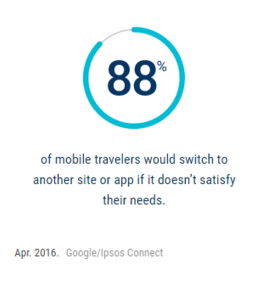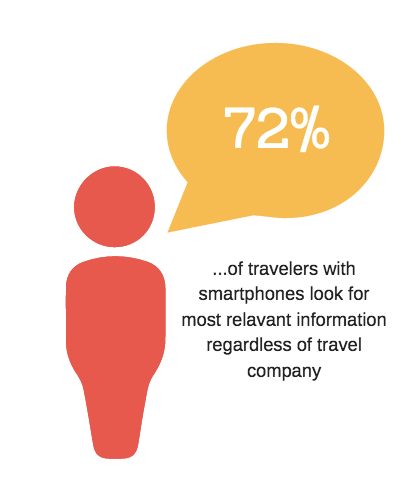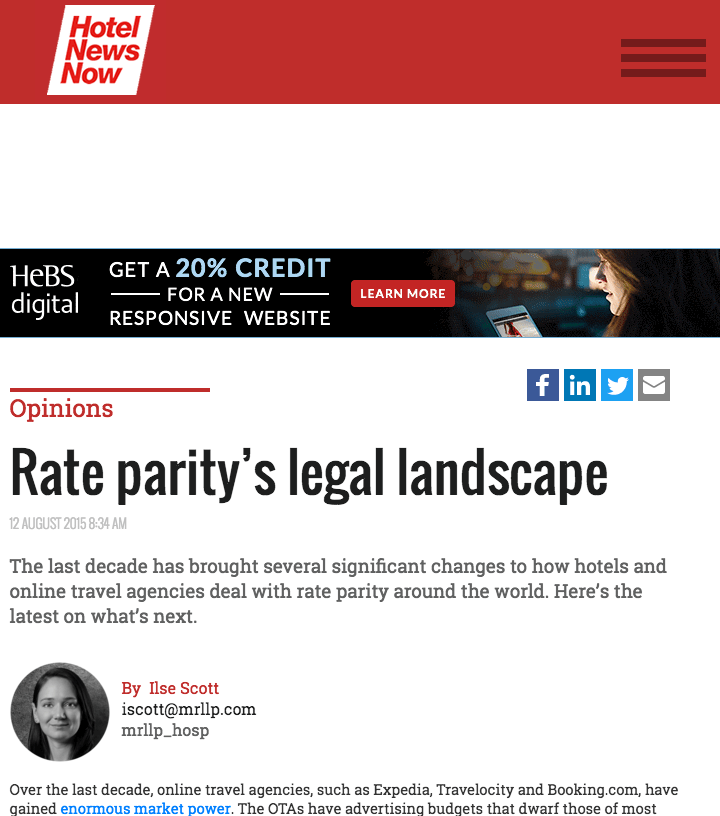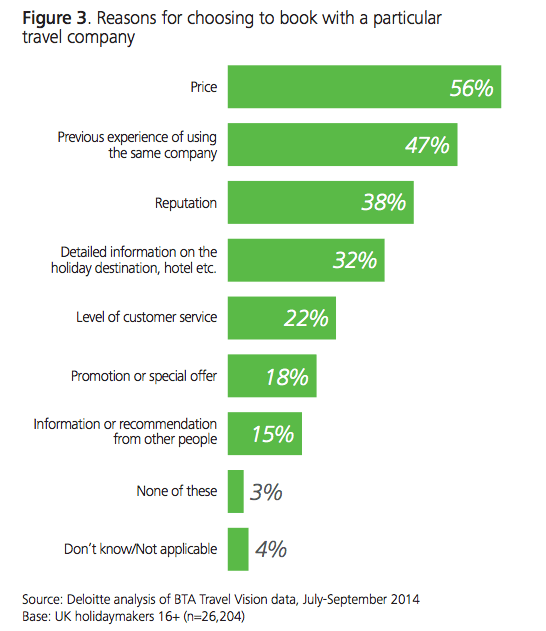“A trip was the largest discretionary purchase last year according to nearly 60% of leisure travellers,” reports a recent study of U.S. travelers. Consumer trends show that people are willing to pay more for the right experience when booking online. Is it time to shift your travel distribution conversations from price cutting to experience building?
Creating a unique experience online can drive more volume at a higher price point. Understanding the distribution channel target markets, and how to reach their sweet spot, can increase revenue without sacrificing Average Daily Rate (ADR).
Unique content for 100s (or 1000s) of different sites can be a management nightmare. Tools that help you curate content and target the right channels at the right time are key to maximising reach and increasing value.
Consumer Trends
 Personalisation of data and instant access to millions of data points have created an environment where consumers expect a custom experience designed to fit their likes, dislikes, preference and needs. Predictive algorithms used to suggest purchases are becoming less “cutting edge” and more “required to do business”. As stated by Travel Weekly’s Consumer Trends 2016 , “Satisfaction with previous experience was the reason most often cited for choosing any booking channel…” This corresponds directly with the price point booked by these consumers going up 40%, $435 average per night vs. $263. Deloitte also tells us that 47% of users cite previous experience as the reason that they return to a booking site. Consumers are focusing more on the site/app experience but industry conversations are still focused on price.
Personalisation of data and instant access to millions of data points have created an environment where consumers expect a custom experience designed to fit their likes, dislikes, preference and needs. Predictive algorithms used to suggest purchases are becoming less “cutting edge” and more “required to do business”. As stated by Travel Weekly’s Consumer Trends 2016 , “Satisfaction with previous experience was the reason most often cited for choosing any booking channel…” This corresponds directly with the price point booked by these consumers going up 40%, $435 average per night vs. $263. Deloitte also tells us that 47% of users cite previous experience as the reason that they return to a booking site. Consumers are focusing more on the site/app experience but industry conversations are still focused on price.
The power of content
Content consumption rate is much higher than the content creation and distribution rate. Getting more unique product on the online shelves faster is increasingly important to reaching a diverse audience. Online distribution partners are shifting to API based product creation environments that can be automated, rather than the traditional static spreadsheet and email based product creation of the past.
Make sure that you partner with technology providers that can collect, manage, and distribute your content in as automated (yet flexible) ways as possible. Doing everything manually and in multiple places will quickly become overwhelming and unmanageable.
Choose a content management system that can curate existing content. Simple use of tagging on reusable pieces of content, such as property amenities, can create those unique views automatically.
Make sure all partners can use those tags to put the right content in front of the right people at the right time. “Seventy-two percent of travellers with smartphones agree that when researching on their smartphones, they look for the most relevant information regardless of the travel company providing the information,” observes a recent Think with Google article.

It is clear that travellers’ loyalty is more towards their own needs than any specific brand. Therefore content providers must meet those needs on as many platforms as possible if they want to get that business. It’s critical to future success in the online space that technology providers don’t settle for the “same old thing” that they’ve been doing for years. Content is no longer just about the hotel name, address, description and a bulleted list of property amenities. More robust content that can be delivered quickly and accurately is key to success in this space.
Content is already moving beyond the core set of information; user generated reviews, photos, and blogs are becoming increasingly commonplace. The next wave of improvements to user experience is likely to be customisation of the displayed content to each user. With the rise in mobile users, this becomes increasingly important – the limited real estate of the smartphone makes content relevance increasingly crucial for user satisfaction. Use of current as well as historical behaviour of the site visitor in building personalised content on-the-fly leads to better relevance of displayed information and hence to better user experience.
So it is important to choose a content management system that is best equipped to handle current trends in the sophistication of content creation and also has the best potential to be prepared for future needs in this regard.
The value of trust
The rapid increase in creation and use of user generated content such as reviews, photos, and blogs, show that consumers want to build trust in the booking platform, agency and/or hotel that they are interacting with.
The same product will be purchased on a trusted site, even if it’s a higher price, than a non-trusted site. Use review management tools to ensure trust is established with those partners that bring the highest value bookings.
Suppliers need to do business with a variety of distribution types. By looking at who is talking about their destination, their type of hotel, or their type of experience, suppliers can find some already trusted distribution channels that may not be mainstream but highly valuable. Distribution channels need to ensure that they are establishing trust with their consumers. There are many companies out there today that can provide consolidated, trusted, user generated content to enhance the online experience.
Experience driven opportunity
Price point is often not the most important consideration for the consumer. Many times a life moment or current need will drive a customer to book when they previously would not. For example, Red Roof Inn ran a “Stranded at the Airport? Come Stay with Us!” campaign that increased their bookings by 60% across non-branded searches on Google. This shows the importance of grabbing these experience based opportunities. Not all consumers will go through the traditional dream-research-book- experience-share life cycle. Most travel technology systems today don’t have the capability to quickly react to these on-the- fly experiences. Find one that can.
Rate-Parity in the legal system
 Over the past year, the parity clauses and “best rate guarantees” in the hotel supplier/ hotel distributor contracts have come under much scrutiny in the legal world. Several lawsuits brought against online distributors in the US last year went all the way to the Supreme Court. Though the claims that parity clauses violated anti-trust laws were ultimately dismissed, according to Hotel News Now, “The court agreed that promises to provide consumers with the ‘best’ or ‘lowest’ price were misleading, because they implied that consumers were receiving the lowest price available in a competitive market, when in fact the rate-parity agreements ensured that it was simply the same rate offered elsewhere online.”
Over the past year, the parity clauses and “best rate guarantees” in the hotel supplier/ hotel distributor contracts have come under much scrutiny in the legal world. Several lawsuits brought against online distributors in the US last year went all the way to the Supreme Court. Though the claims that parity clauses violated anti-trust laws were ultimately dismissed, according to Hotel News Now, “The court agreed that promises to provide consumers with the ‘best’ or ‘lowest’ price were misleading, because they implied that consumers were receiving the lowest price available in a competitive market, when in fact the rate-parity agreements ensured that it was simply the same rate offered elsewhere online.”
In Europe, governments in Sweden, Italy, France and Germany determined that these parity clauses “have anti-competitive effects and could potentially lead to a restriction of competition.” These types of legal actions show that consumer protection organisations are looking at the value of a booking experience as a tangible thing.
If one booking entity appeals to a consumer over another, they should be able to adjust the price point according to what that consumer is willing to pay. We find that parity rules tend to drive the hotel ADR down rather than up. If a hotel does not have the freedom to offer different prices to those entities providing different value, the price will always end up being that of the lowest common denominator. This does not bode well for the hotelier and it does not foster an experience based competitive environment. This directly conflicts with consumer trends that show that experience during the booking process, and during their stay, are just as important as price.
There’s always a balance
 So how do you manage this experience vs. price world that we’re moving to? Here are some things for hotels to consider and bring to those technology and distribution partners with whom they work.
So how do you manage this experience vs. price world that we’re moving to? Here are some things for hotels to consider and bring to those technology and distribution partners with whom they work.
- Identify a property or brand’s unique experience. What makes this hotel, this brand, this location, different or unique?
- Match that experience to the ideal consumer. Who is most likely to be attracted to that experience? Who could you be missing?
- Talk to your partners about their ideal customers. Do they match yours? What kind of market share can that partner bring to your target experience? Which partners really understand the consumer experience?
Maximise those matches and set realistic targets for those that may be ancillary. What kind of content is needed to maximise the experience for the travel consumer on each channel? Is there additional, curated content you could provide to increase conversion without degrading price? Push back on those partners that only offer price reduction as a way to increase production.
Price is an important component of the travel decision, but it’s no longer the only major piece. Content creation and presentation are moving up rapidly on the consumer’s priority list. It’s important that we focus on finding that balance in our technology and our business relationships/conversations.
Investment in content creation and content management systems should be just as important as revenue and price management systems. Partner with someone that can give you not only accurate and flexible rate distribution but also someone that can match that with robust, customisable, experience based content.

